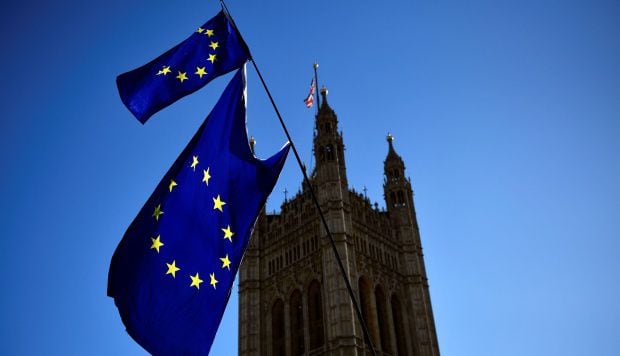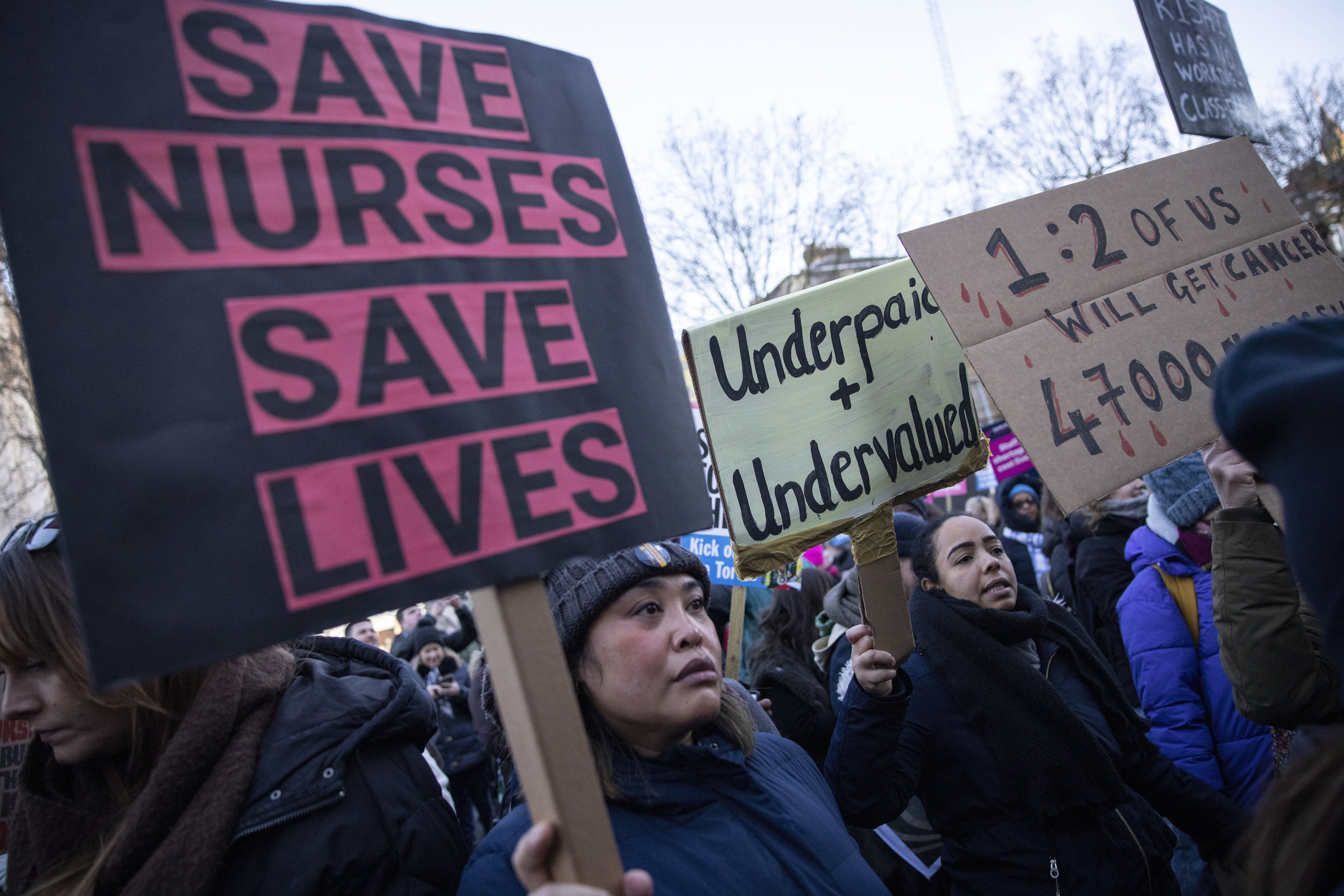Anger in the working class United Kingdom Does not yield. In recent months, personnel from key sectors such as health and transportation, as well as airport and postal workers have stopped their activities to demand salary increases amid the crisis caused by the increase in the cost of living. This Wednesday the 18th, thousands of nursing employees once again made themselves heard with a new strike that affected almost a quarter of the hospitals and clinics in England.
LOOK: UK mourns death of Minister Monastyrsky, ‘a guiding light’ in resistance against Russia
With the 12-hour strike called for this Wednesday and Thursday, nurses have sent the message that they intend to stand firm and have already announced new strikes for February. In addition, the Unite union threatened more work stoppages by the country’s ambulance personnel.
With this, thousands of appointments and procedures will continue to be postponed, increasing the pressure on the saturated public health system in the country. In December, the nurses staged a nationwide strike unprecedented in their union’s 106-year existence.
The nursing collective has rejected an offer for a 4% increase, well below the 19% that the sector claimed and then proposed to reduce by half.
The government has responded to the countless strikes in various sectors by arguing that raising wages would mean cuts in patient care and cause inflation to rise. Prime Minister Rishi Sunak said the health system faces “unprecedented challenges” but the government is spending money to alleviate the situation.
Inflation in the United Kingdom it reached 11.1% in October 2022, the highest figure in 41 years, driven by energy and food prices, before falling slightly to 10.5%, reports The Associated Press.
The Italian international analyst Francesco Tucci points out that, at this point, the situation is more serious than previously thought. “Probably, from a socio-economic point of view, this is the most difficult situation since the end of the Second World War. It is a very serious crisis and strikes continue in all sectors. I don’t remember a strike of this magnitude, with different sectors of workers”, he tells El Comercio.
Enrique Banús, director of the Institute of European Studies of the University of Piura, thinks along the same lines, that what has been there for months is finally coming to light and no one from the government wants to acknowledge: “The situation has gotten much worse and is likely to continue to get worse. But now society is tired of being ignored by politicians”, he tells this newspaper.
The Brexit Factor
There are many factors that are linked to the economic crisis that has led to the strikes, such as the effects of the pandemic, inflation, the drop in purchasing power and the demands of the unions. However, experts emphasize Brexit and all the consequences it has brought for the country, including the fact that many non-British workers, including nurses, left the country.

Tucci considers that the consequences of Brexit have been forceful because the labor market in the United Kingdom has changed and, just as there has been a change in the private sector, there has also been a strong impact as a result of inflation, the reduction in purchasing power.
“There have also been problems that have to do with the supply of products. It must be remembered that when Brexit came to fruition in the first months there were problems with this issue because the carriers were European, not British. All of this has had an impact on the economic fabric and also has repercussions on the public sector because prices have risen, so the purchasing power of the public sector has been dramatically reduced“, Explain.
For Banús there is no doubt that what we are seeing is basically a consequence of Brexit. Remember that for a while the government managed to make people believe that the situation was due to the war in Ukraine and then wanted to attribute it to other causes such as the bureaucracy in Brussels that unnecessarily complicated things.
“But it is Brexit and its various derivations, such as the problems of lack of manpower, which were the first to be noticed and which have remained in transport and in other sectors, where the lack of workers who came from other countries. There is also the issue of rising prices, tariffs make products more expensive, it is Brexit. There are other elements that are present everywhere, but a very high percentage of this crisis is due to Brexit”, he points out.
Experts emphasize that Brexit has impacted the whole of the UK, but it is always the lowest income earners who are hit the hardest because any price rise hits them the hardest.
no solution in sight
Another factor that explains the current situation is how the political class has acted to face the consequences of Brexit.
Tucci points out that British politicians have added fuel to the fire and, instead of solving the problems, they have created new ones. “You also have to consider the political instability that is not helping because there is a lack of strong leadership in the Conservative Party, which has undergone several changes in recent years, but without going through elections,” he comments.
He adds that he does not see what the way out of the crisis could be because the government has not wanted to sit down and negotiate with the representatives of the unions. In this context, the Sunak executive presented a bill to establish minimum services in some sectors that on Monday began to be examined by parliament, but has given no sign of responding to the workers’ requests.
“These strikes are going to have a great impact on the country and there is no easy way out because Sunak, following the path of the conservative leaders, wants to negotiate up to a certain point and also follows a liberal vision, probably quite orthodox, so he does not want to make concessions and that makes dialogue difficultsays Tucci.
For his part, Banús believes that the first step to reduce tensions is for politicians to come clean about the situation and to recognize the root of the problem. Few have spoken openly about the issue, including London’s Labor mayor Sadiq Khan, who a week ago called on Downing Street to admit the “immense damage” caused by Britain’s departure from the European Union and acknowledge that “Brexit is not working”.
“Until there is a diagnosis also accepted by politicians, there will be no solutions. What they have done so far is delay some of the consequences of Brexit. For example, renegotiating some things with Brussels. What has happened is that until recently it was a taboo subject and now at least it is being talked about.says Banus.
Source: Elcomercio
I am Jack Morton and I work in 24 News Recorder. I mostly cover world news and I have also authored 24 news recorder. I find this work highly interesting and it allows me to keep up with current events happening around the world.

:quality(75)/cloudfront-us-east-1.images.arcpublishing.com/elcomercio/GSQOACKHKNFZDI4SLQAGUICMGI.JPG)


:quality(75)/cloudfront-us-east-1.images.arcpublishing.com/elcomercio/ERN4VP5GOVHMDNJNN7X4PJXUU4.jpg)
:quality(75)/cloudfront-us-east-1.images.arcpublishing.com/elcomercio/KTULWF4PVFEWNIVNFCO52VHSWE.jpg)
:quality(75)/cloudfront-us-east-1.images.arcpublishing.com/elcomercio/WVYPCDI7QBDERLUHD6SUNTFN4E.jpg)

